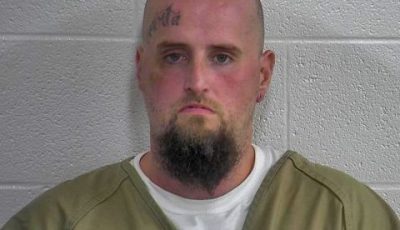Corbin man accused of contracting out murders attempting to have evidence thrown out
The federal trial of a Corbin man accused of attempting to pay to have four people, including Commonwealth’s Attorney Allen Trimble and Whitley County Attorney Bob Hammons, killed, is scheduled to begin Tuesday, but a judge must decide whether or not prosecutors may use phone calls and a note to help build their case.

William Sutton is accused of trying to hire someone to kill four people, including two prosecutors.
In the motion filed Wednesday in U.S. District Court in London, Willis G. Coffey, the attorney for 54-year-old William Timothy Sutton, said the calls and hand-written note involve communications between Sutton and his wife, Joyce while Sutton was being held in custody at the Whitley and Laurel County Detention Centers.
“In all of the calls some of the underlying facts of the case are discussed,” Coffey stated.
“As to the note, (it is counsel’s understanding) it was written by William to be shown only to Joyce during a jail visit,” Coffey stated in the motion.
Coffey argues in the motion that under established case law, communications between spouses are privileged.
In the prosecution’s response to the motion, Assistant U.S. Attorney Samuel Dotson argues that while the calls were between spouses, communications over jail telephone lines may be recorded and are not confidential.
“The spousal communications privilege does not apply,” Dotson stated in the response.
Coffey argued in the motion that the Suttons are heard on the recording speaking in hushed tones to avoid anyone nearby from hearing what they were saying.
Dotson argues that the fact that the Suttons were speaking on a monitored telephone line at the jail facility makes the privilege argument invalid.
“Communications made in the presence of a third-party are not made in confidence, and therefore, not protected by spousal communications privilege,” Dotson stated in his response.
Dotson pointed to a 2010 case, United States v. Medlin, which concerned the exact same situation.
“Because in Medlin, as here, the defendant knew that all calls were being recorded and were subject to monitoring by jail officials. The court refused to exclude the telephonic communications with his wife,” Dotson stated adding that in this particular case a recorded statement was played at the beginning of each call alerting the inmate and the person they were calling that the call was not confidential and that it would be recorded and/or monitored.
Dotson added that in several of the calls, both William and Joyce Sutton make references to the fact that the calls are being recorded and monitored, there should have been no expectation of privacy.
U.S. District Court Judge Gregory VanTatenhove has not indicated when he may issue a ruling on the matter.
Sutton’s case was scheduled to go to trial Jan. 16 in London. However, the case was continued until Tuesday because of the inclement weather.
Sutton is accused of attempting to hire another inmate in his cell at the Whitley County Detention Center, John Combs, to kill the four individuals.
Kentucky State Police Trooper David Lassiter testified during a preliminary hearing in Whitley District Court on April 3 that Sutton allegedly offered $10,000 to Combs to kill each of the individuals, or a total of $40,000.
In addition to Trimble and Hammons, the individuals were later identified as Tara Smith and Stephanie Broyles.
Broyles is the complaining witness in a violation of an E.P.O. case against Sutton.
Smith is involved in a child support case involving Sutton.
Sutton was initially arrested in Whitley County on March 9 on four counts of complicity to commit murder, four counts of retaliating against a participant in a legal process and possession of a firearm by a convicted felon.
A federal indictment was returned against Sutton in July in connection with the case.
The grand jury charged Sutton with four counts of using the mail or a facility of interstate commerce with the intent that four individuals be murdered in exchange for a promise and agreement to pay another to commit the murders.
If convicted in U.S. District Court, Sutton faces up to 10 years in prison, a $250,000 fine and three years supervised release in the murder solicitation cases.






